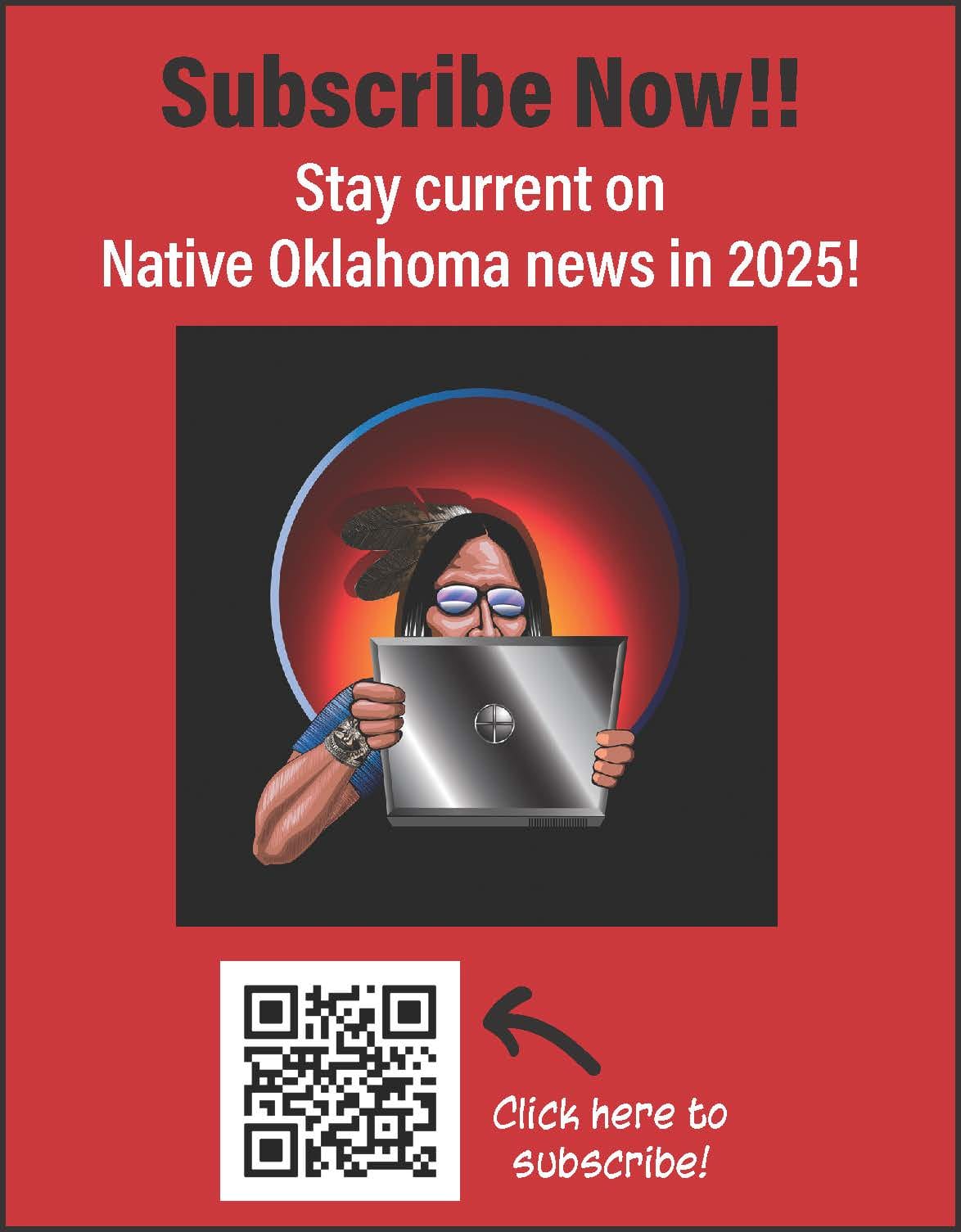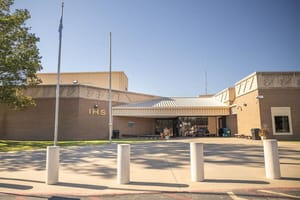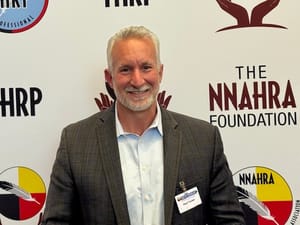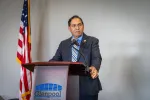

Chairman Barrett honored as Tribal Leader of the Year
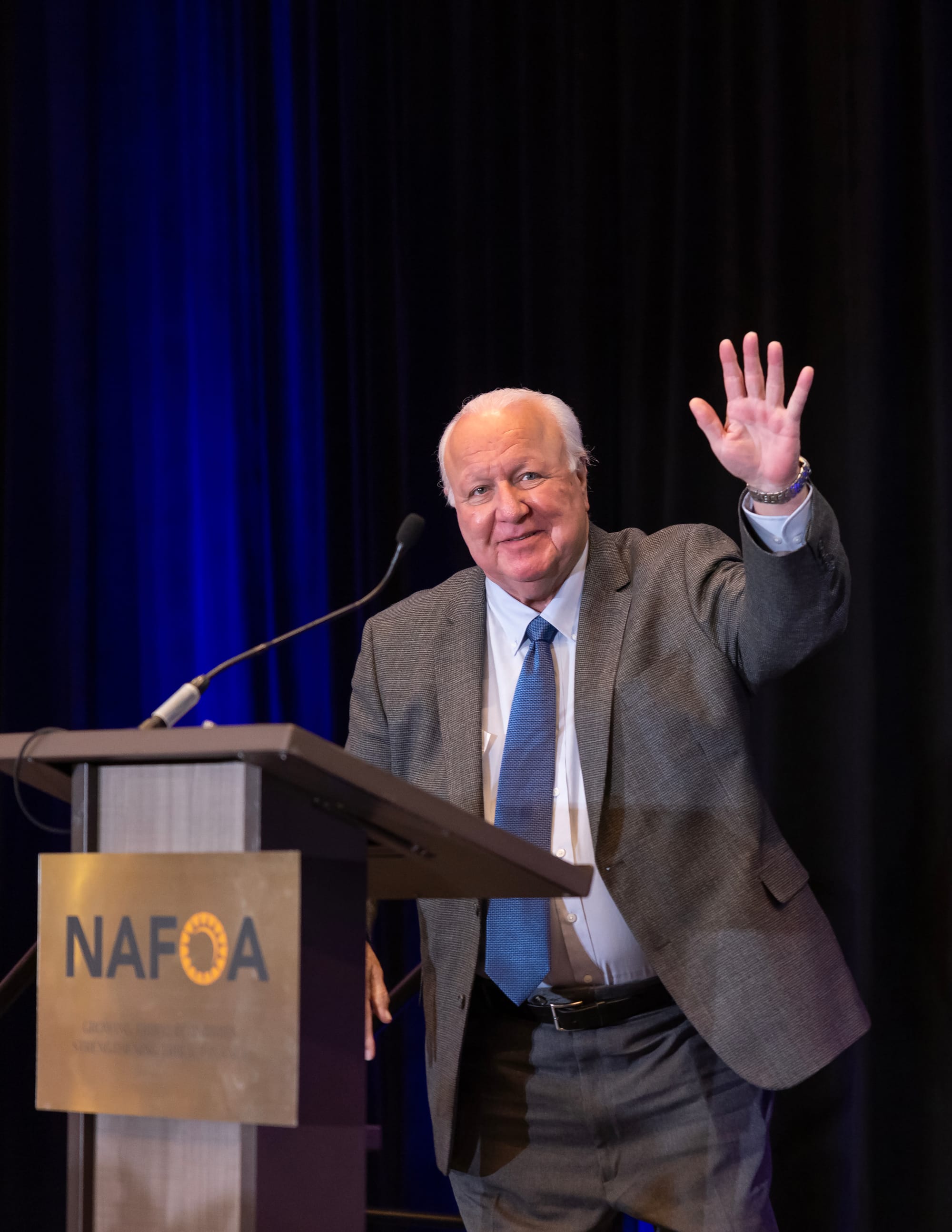
By: Tina Bridenstine, Citizen Potawatomi Nation Public Information Department
NAFOA (Native American Finance Officers Association) honored Chairman John “Rocky” Barrett as the Tribal Leader of the Year at its 43rd annual conference at the end of April in New Orleans.
Each year, NAFOA celebrates those who have had a lasting and positive impact on tribal economies, with the Tribal Leader of the Year award considered the highest honor for elected leaders. The award recognizes leaders who have “displayed significant foresight and resolve in the financial advancement” of their tribal nations.
“Visionary. Leader. Honored one. These are a few of the words which describe the chairman of the Citizen Potawatomi Nation,” CPN Chief Financial Officer Mary Chisholm said in her introduction of Chairman Barrett at the awards luncheon.
He received a standing ovation from attendees as he accepted his award, and he offered those present a heartfelt thanks of igwien.
Chairman Barrett thanked the members of the NAFOA board for the honor, CPN employees and management, especially those of the Tribe’s Sovereign Bank, several of whom attended the conference, and Tribal members who have allowed him to serve in office by voting for him for 11 terms.
During his speech, Chairman Barrett also spoke of the decisions all leaders make that have unfortunate consequences and how important it is to acknowledge those mistakes and learn from them.
“What we do not do, as is the current political fashion in other governments that we deal with, is just to deny that the mistakes ever happened and lie about the results and say what a great accomplishment they were,” he said.
Though identifying as a conservative, Chairman Barrett talked about how troubled he is by the current political environment.
“The ghastly impact of these first 100 days of this administration will be remembered as the time of the most self-destructive acts by the federal government in modern history,” he said.
He spoke of the resurgence of populist governments every two to three generations and how they serve as a threat, especially to tribal governments, and discussed what he believes to be the best path to navigate the current environment.
“We need to make ourselves, as governments, an indispensable part of those non-Indian communities with which we share territory,” Chairman Barrett said, explaining some of the ways CPN has partnered with surrounding communities, from operating a state-chartered rural water district to having CPN officers deputized to serve Pottawatomie County to paving and lighting roads.
“We hope that if and when the federal government acts to harm us in some way that both our tribal and non-tribal neighbors will come to our defense at the polls, because we are needed in the community and because we are essential to the quality of life for our neighbors. And that will be when America returns to its original, conservative values.”
Chairman Barrett closed by asking NAFOA officers to excuse his use of his speech to discuss politics.
“I ask your forgiveness, but I’m not alone in my alarm. It is based on over 40 years in tribal elected office, and 24 of those years in litigation with either the city, the county or the state of Oklahoma,” he said. “My advice will be held in as much value, I hope, as I hold your award in value. And I thank you from my heart for it.”

Tribal governance, health care, energy on Tribal lands, cybersecurity, and intergovernmental relations on the docket for UINO quarterly meeting
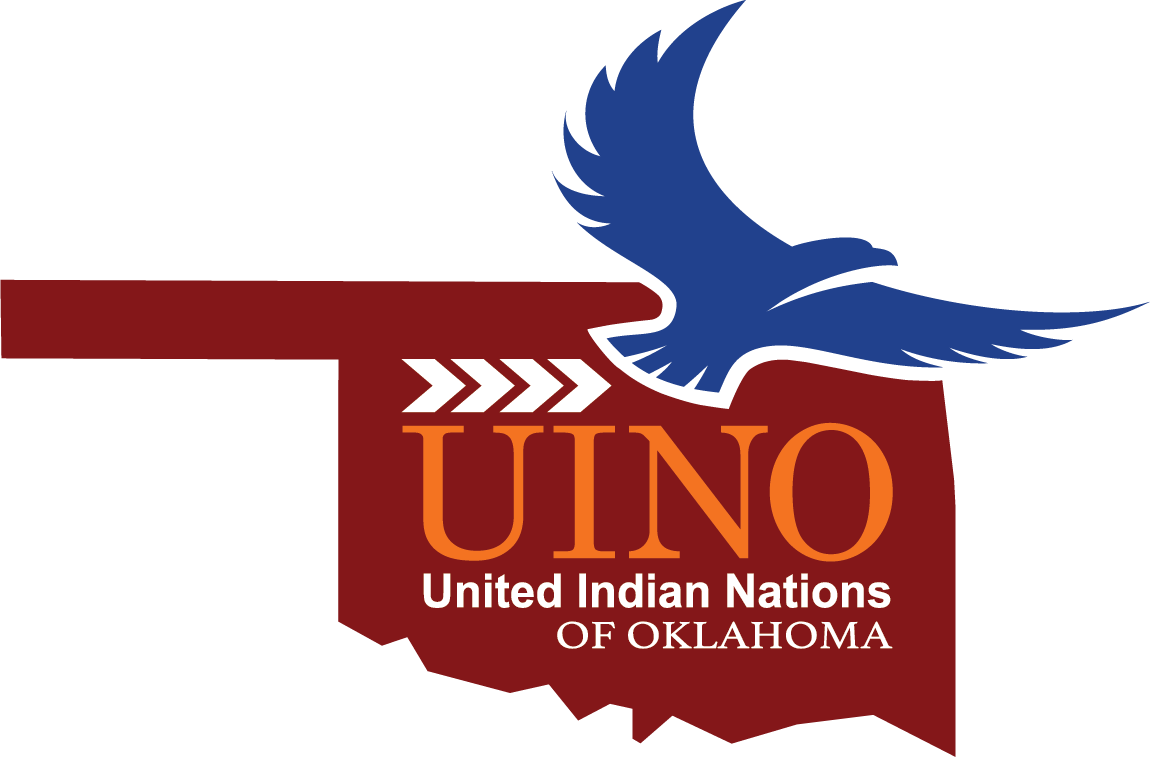
OKLAHOMA CITY — United Indian Nations of Oklahoma (UINO) will convene its quarterly meeting on Tuesday, June 24, 2025, at OKANA Resort and Indoor Waterpark in Oklahoma City. The agenda reflects a powerful lineup of Tribal leaders, policy and legal experts, and community advocates coming together to discuss critical issues facing Tribal Nations in Oklahoma.
The day will begin with breakfast and registration at 8 a.m., followed by opening remarks from UINO Chairperson Chief Ben Barnes of the Shawnee Tribe, roll call from UINO Secretary Chief David Hill of the Muscogee (Creek) Nation, and a financial report from UINO Treasurer Bruce Pratt.
"This gathering is about uniting our priorities and moving forward with a shared vision of Tribal sovereignty, self-determination, and economic strength," said Chief Ben Barnes, Chairperson of UINO. "Our agenda reflects the leadership, collaboration, and resilience that define Indian Country in 2025."
The meeting spotlights pressing challenges and opportunities across Indian Country, featuring panel discussions on Tribal governance, health care, energy development on Tribal lands, cybersecurity, and intergovernmental relations.
The morning agenda* will feature high-level panel discussions on:
- Tribal Leadership and Governance
- Native Healthcare Reform and Reorganization
- Energy Development and Emergency Permitting on Tribal Lands
- State-Tribal Intergovernmental Relations
- Cybersecurity Threats and Protections for Tribal Enterprises
Confirmed Tribal leaders include:
- Chief David Hill, Muscogee (Creek) Nation
- Chairwoman Jennifer Heminokeky, Fort Sill Apache Tribe
- Chairwoman Kim Jenkins, Kaw Nation
- Chief Lewis Johnson, Seminole Nation
- Governor Reggie Wassana Cheyenne and Arapaho Tribes
- Lt. Governor Hershel Gorham, Cheyenne & Arapaho Tribes
- Secretary/Treasurer Linda Valliere-Siegmann, Quapaw Nation
Matthew Morgan, Chickasaw Nation Special Envoy and Chairman of the Oklahoma Indian Gaming Association (OIGA), will deliver the keynote address. Morgan will present findings from the recently released 2025 Oklahoma Tribal Impact Study, which revealed a record-breaking $23.4 billion annual economic impact by Oklahoma’s Tribal Nations, a nearly $5 billion increase over the past five years.
Other speakers include leaders and experts in health care, energy, law, taxation, gaming, economic development and other critical areas.
“This is a critical time for Indian Country to unite and shape our future,” said Margo Gray, Executive Director of UINO. “From defending sovereignty to securing economic opportunities, we are building coalitions and investing in the next seven generations of Native leaders. This meeting is about solutions, strategy, and solidarity.”
Action items on the agenda include:
- Consideration of UINO joining the Coalition for Tribal Sovereignty
- A letter of support for Haskell Indian Nations University
For the first time, UINO will host a limited number of vendor booths. Spaces are available for $100 and are open to businesses and organizations wishing to share or sell their work.
Membership in UINO is open to:
- All federally recognized Oklahoma Tribal Nations
- Corporate and nonprofit organizations
- Individuals of legal voting age who are enrolled citizens of Oklahoma-based Tribal Nations
To learn more about membership or vendor opportunities, visit www.uinoklahoma.com/membership or contact Executive Director Margo Gray at margo@uinoklahoma.com.
Oklahoma Democrat Seeks DNC Vice Chair After Overturned Election
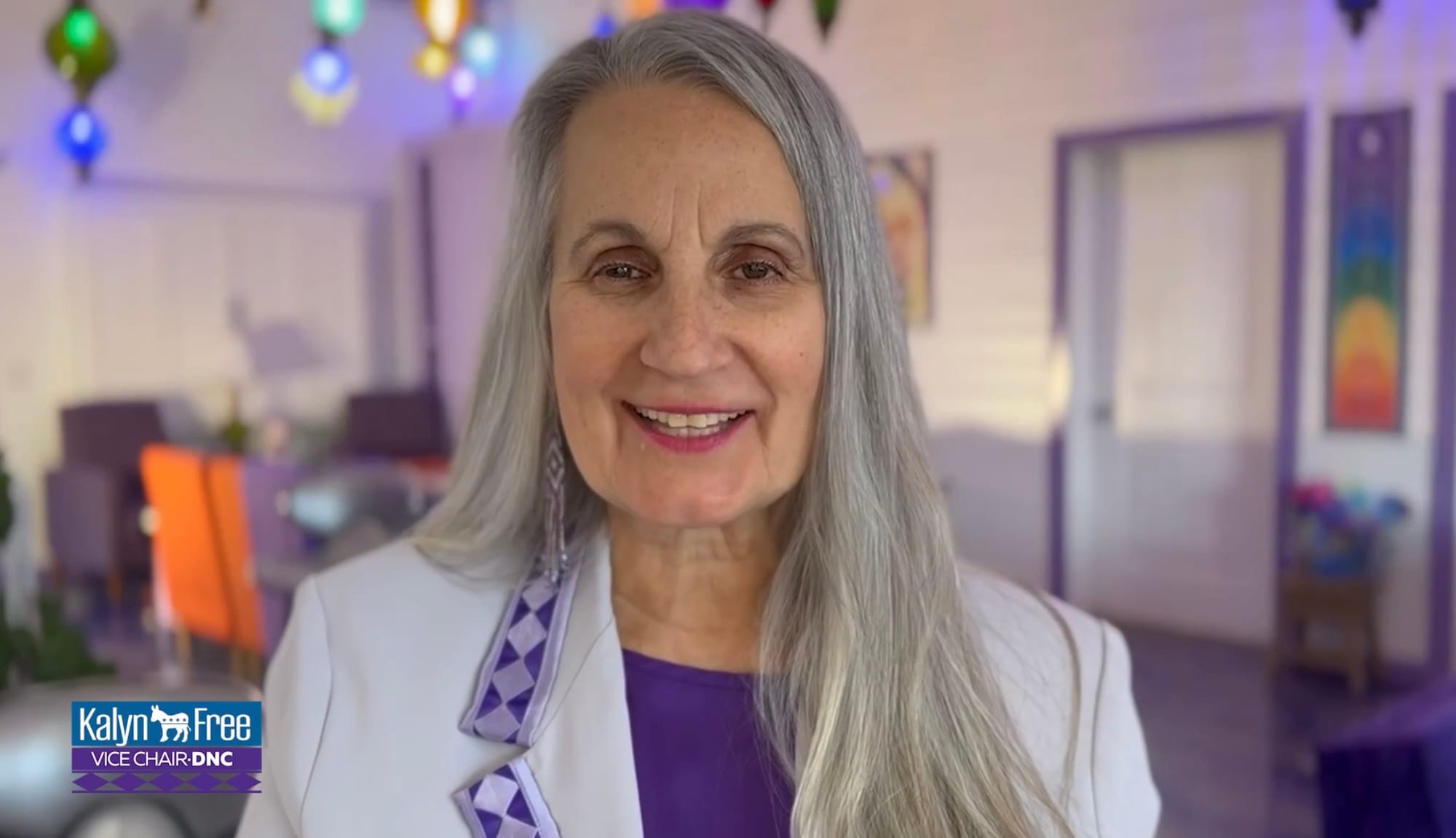
By Blake Madden, Gaylord News
WASHINGTON—Kalyn Free — a Native American attorney and longtime Oklahoma Democrat — is running again for DNC vice chair, hoping to reshape the party’s focus on rural and Indigenous communities following last week’s decision by the Democratic National Committee to toss out its February election.
The February ballot was thrown out following a 294–99 vote by DNC members to hold new elections after Kalyn Free, who lost the initial vote, challenged the results, saying the election violated the party’s gender parity rules and charter.
In her challenge, Free claimed that the process gave male candidates a mathematical advantage and violated the party’s gender parity requirement, which requires equal male and female representation in the DNC’s executive committee.
“We stand for free and fair elections, and so it was important to me that this be corrected,” Free said.
The DNC’s vote last Wednesday upheld Free’s challenge, leaving the vice chair seats previously held by Malcolm Kenyatta and David Hogg up for grabs. Following the decision, Hogg dropped out of the re-election bid, leaving one male and three female candidates, including Free, competing for the two positions.
Of the two vice chair seats, one must be held by a man — a position Kenyatta is expected to retain. That leaves Free, Kansas Democratic Party Chair Jeanna Repass, and Washington Democratic Party Chair Shasti Conrad to compete for the remaining seat.
The new election will take place on Tuesday, June 17, when the party’s roughly 500 national committee members — including state party chairs, elected officials, and organizational delegates — will cast their votes.
Free is seeking to become the first Native American and a Choctaw Nation member elected as DNC vice chair, arguing that the party has long neglected red states and Indian Country. In recent years, Democrats have struggled to maintain trust among rural voters, a challenge that she says the party must urgently address. Because of her rural upbringing near Red Oak, Oklahoma, Free says she understands “what the needs are in rural America.”
“The blue wall has crumbled,” Free said, referring to the party’s reduced support in states that have historically been reliable Democratic strongholds. “There are rural parts of this country in every state, and we have to start talking, and not just talking to those people, but listening to those folks.”
Free said Native American support is an integral part of the Democrats’ “winning strategy”, not just for the presidency, but also for gaining control of Congress. She pointed to key battleground states like Arizona and Nevada, where Native turnout has proven decisive, as evidence that investment in tribal communities can shape electoral outcomes.
If elected, Free plans to work with tribes across the country to “build a year-round organizing effort” that goes beyond short-term outreach and campaign fundraising, such as recruiting tribal candidates and engaging voters on issues that matter to Native communities.
“They deserve to be supported, but that is an educational effort, and that takes resources,” Free said. “It is an opportunity, for the first time in the history of the Democratic National Committee, to build a program that truly integrates the Democratic Party into Native communities.”
At a time when trust in the Democratic Party has eroded in rural regions and among key voting blocs, Free said the party’s long-term success will depend on its willingness to engage communities that feel overlooked.
“The Democratic party’s goal is not solely to elect the President of the United States, although that is a primary function of the National Party,” Free said. “But it's also to build in states and to build strong parties in the states. It's very difficult to operate, not just in Oklahoma, but in other red states, if we don't have a strong party apparatus.”
She pointed to Tulsa Major Monroe Nichols, a Democrat, as an example that progress is possible for Democratic candidates when they speak directly to local concerns and don’t “shy away from issues that other candidates would have shied away from.”
“I think it's very important for the party, not just on the national level, but on the state and local level, to recruit candidates and vet candidates that are true to our values, and that will run as Democrats and will win as Democrats,” she said.
